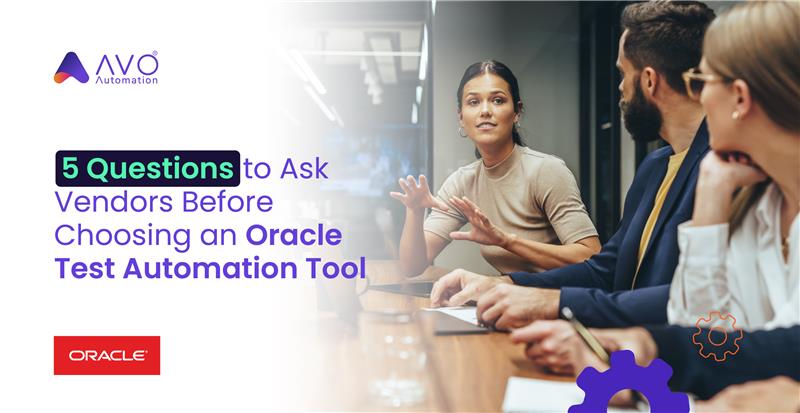Oracle’s dynamic and interconnected ecosystem is integral to enterprise operations, making the selection of the right test automation tool critical. To ensure seamless testing, reduced risks, and maximized ROI, decision-makers need to ask vendors targeted questions that address core areas like support, scalability, licensing, and integration with Oracle updates. Here’s a comprehensive guide to help you evaluate vendors and choose the best Oracle test automation tool for your needs.
1. Is the Tool Compatible with Your Oracle Environment and Technology Stack?
Compatibility is the cornerstone of any test automation tool. Oracle applications often interact with ERP platforms, CRM systems, APIs, and custom-built solutions. It is essential to select a tool that supports comprehensive, end-to-end testing.
Key Considerations:
- Multi-Channel Testing: Can the tool automate testing across web, mobile, desktop, APIs, and cloud-based systems?
- Oracle-Specific Compatibility: How does your tool integrate with Oracle applications such as Oracle EBS, Oracle Fusion, and Oracle Forms?
- Cross-Browser Testing: Does the tool work seamlessly across multiple browsers and devices?
How to Evaluate Vendors:
- Request specific examples of supported Oracle modules and integrations.
- Verify the tool’s ability to handle both functional and performance testing in your technology stack.
- Check for support for emerging technologies like AI-driven impact analysis.
To learn more about strategizing Oracle testing plan check out: https://avoautomation.ai/blog/oracle-test-automation-plan-2025-the-roadmap-to-seamless-transformation/
2. How Scalable and User-Friendly is the Tool?
Scalability ensures the tool can handle large volumes of testing as your organization grows. Additionally, an intuitive interface can reduce dependency on technical expertise and speed up implementation.
Key Features to Evaluate:
- Codeless Capabilities: Does your tool require coding or is it codeless, allowing non-technical users to automate test cases?
- Flexibility in Customization: How flexible is your tool in customizing test cases to suit changing business needs?
- Scalability: Can the tool manage high volumes of test data and complex workflows?
How to Evaluate Vendors:
- Ask about real-world examples of scalability in large enterprises.
- Understand how the tool manages test data to ensure efficiency and accuracy.
- Request a demonstration of codeless automation capabilities.
Check out the importance of automating Oracle testing here: https://avoautomation.ai/blog/manual-vs-automated-testing-for-oracle-the-cost-of-falling-behind/
3. What Type of Support and Training Do You Offer?
Vendor support can make or break the success of a test automation tool implementation. Comprehensive support and training options help teams navigate challenges and maximize the tool’s potential.
Key Support Aspects:
- Availability: What type of support and training do you offer, and is it available 24/7?
- Training Resources: Does the vendor provide detailed user manuals, video tutorials, or live sessions?
- Community Engagement: Is there an active user community for peer-to-peer learning?
How to Evaluate Vendors:
- Ask for specifics on support response times and escalation protocols.
- Request access to training materials or trial sessions to gauge usability.
- Explore forums, webinars, and knowledge bases provided by the vendor.
Dive deeper into the impact of AI in Oracle testing here: https://avoautomation.ai/blog/future-proofing-oracle-testing-with-ai-and-no-code-automation/
4. How Does the Tool Handle Oracle Updates and Maintenance?
Oracle’s quarterly updates and patches require a test automation tool that adapts seamlessly. Without robust update mechanisms, organizations risk disruptions and increased manual intervention.
Key Maintenance Features:
- Automated Updates: How does your tool handle updates and new Oracle releases?
- Impact Analysis: Can the tool identify and update impacted test cases automatically?
- Update Frequency: How often do you release updates for the tool to ensure compatibility with Oracle changes?
How to Evaluate Vendors:
- Request documentation or case studies on the tool’s performance during Oracle updates.
- Evaluate the tool’s ability to perform smart regression testing post-update.
- Confirm the availability of automated patch validation.
5. What is the Pricing Structure and Licensing Model?
Understanding the pricing structure and licensing model ensures no surprises post-implementation. Look for tools that align with your budget while offering long-term value.
Pricing Metrics to Review:
- Cost Transparency: What is the pricing structure and licensing model, including hidden costs?
- Trial or Demo Options: Do you offer a free trial or demo of the tool?
- ROI Analysis: Can the vendor provide a model to demonstrate potential cost savings and efficiency improvements?
How to Evaluate Vendors:
- Compare costs for initial setup, licensing, and ongoing maintenance.
- Assess the tool’s average setup and configuration time.
- Review ROI calculators or projections provided by the vendor.
Additional Vendor Evaluation Questions
When evaluating vendors, consider the following supplementary questions:
- Integration: Can your tool integrate with other testing frameworks and CI/CD pipelines?
- Security: What security measures are in place for data protection? How is customer data stored and protected?
- Reporting and Analytics: What kind of reporting and analytics does your tool provide?
- System Requirements: What are the minimum system requirements for the tool?
These questions help ensure the tool aligns with your organization’s existing workflows, security policies, and infrastructure.
Why Avo Assure is the Perfect Choice
After carefully evaluating vendors, Avo Assure stands out as an Oracle-aware, no-code test automation tool designed for scalability, usability, and seamless integration. Here’s how Avo Assure addresses key evaluation criteria:
- Comprehensive Compatibility: Supports multi-channel testing across Oracle applications and other platforms like SAP and Salesforce.
- Ease of Use: A codeless platform allows business users and testers to automate without technical expertise.
- Scalability: Handles large volumes of testing with flexibility in managing complex workflows.
- Smart Maintenance: Automates Oracle patch validation and impact analysis, ensuring uninterrupted testing.
- Transparent Pricing: Offers a clear pricing structure, free trials, and ROI models to demonstrate cost-effectiveness.
Learn more about how Avo automates, eases and optimizes Oracle testing here: https://avoautomation.ai/product-sheets/avo-assure-for-oracle/
Conclusion
Selecting the right Oracle test automation tool involves asking critical questions about compatibility, scalability, support, updates, and pricing. By thoroughly evaluating vendors and focusing on these areas, organizations can find a solution tailored to their unique needs. Avo Assure offers a no-code, scalable, and Oracle-aware platform that meets all these criteria, ensuring seamless testing and enhanced ROI for enterprises.

